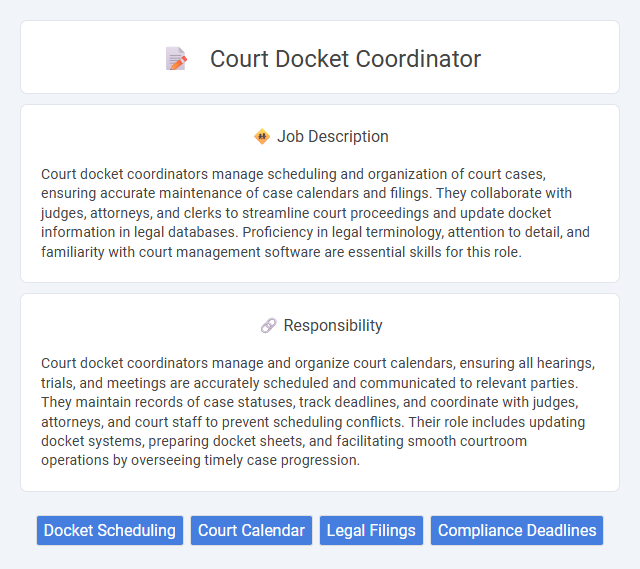
Court docket coordinators manage scheduling and organization of court cases, ensuring accurate maintenance of case calendars and filings. They collaborate with judges, attorneys, and clerks to streamline court proceedings and update docket information in legal databases. Proficiency in legal terminology, attention to detail, and familiarity with court management software are essential skills for this role.
Individuals with strong organizational skills and attention to detail are likely suitable for the role of a court docket coordinator. Those who can handle multitasking under pressure and maintain clear communication with legal professionals may find this job compatible with their abilities. People who struggle with time management or prefer less structured environments might not be as well suited for the demands of this position.
Qualification
Court docket coordinators require a strong understanding of legal terminology, court procedures, and case management software to efficiently maintain and update court schedules. Essential qualifications include excellent organizational skills, attention to detail, and proficiency in communication to coordinate between judges, attorneys, and court staff. A background in criminal justice, legal studies, or administrative support, combined with experience in a judicial environment, enhances the ability to manage complex docket systems accurately.
Responsibility
Court docket coordinators manage and organize court calendars, ensuring all hearings, trials, and meetings are accurately scheduled and communicated to relevant parties. They maintain records of case statuses, track deadlines, and coordinate with judges, attorneys, and court staff to prevent scheduling conflicts. Their role includes updating docket systems, preparing docket sheets, and facilitating smooth courtroom operations by overseeing timely case progression.
Benefit
Working as a court docket coordinator likely offers significant benefits such as opportunities to develop organizational and administrative skills crucial for legal environments. The position may provide exposure to court procedures which can enhance career prospects within the judicial or legal support fields. It's probable that employees in this role receive stable employment with potential for growth in a structured and professional setting.
Challenge
The role of a court docket coordinator likely involves managing complex schedules and ensuring accurate coordination of court cases, which can be challenging due to frequent last-minute changes and high-pressure deadlines. There is a probability that handling multiple stakeholders, such as judges, attorneys, and clerks, adds to the difficulty of maintaining seamless communication and organization. This job probably demands strong multitasking abilities and meticulous attention to detail to prevent scheduling conflicts and support the smooth functioning of the court system.
Career Advancement
Court docket coordinators play a crucial role in managing court schedules and ensuring case flow efficiency, which builds foundational knowledge in judicial processes. Gaining expertise in legal terminology, case management software, and courtroom procedures enhances opportunities for promotion to senior administrative roles or court clerks. Advanced skills and experience in docket coordination can lead to specialized positions such as court administrators or legal office managers, driving significant career advancement.
Key Terms
Docket Scheduling
A Court Docket Coordinator specializes in docket scheduling by efficiently organizing and managing court calendars to ensure timely hearings and case proceedings. They coordinate with judges, attorneys, and clerks to allocate appropriate time slots and prevent scheduling conflicts, optimizing courtroom usage. Mastery of legal software and attention to detail are essential for maintaining accurate, up-to-date court schedules and supporting judicial processes.
Court Calendar
A Court Docket Coordinator manages the court calendar by scheduling hearings, trials, and other legal proceedings to ensure efficient courtroom operations. They maintain accurate records of case statuses, update changes promptly, and coordinate with judges, attorneys, and court personnel to avoid conflicts and delays. Proficient knowledge of legal procedures and case management software is essential to optimize the court calendar and streamline judicial workflows.
Legal Filings
A Court Docket Coordinator manages and organizes all legal filings to ensure timely submission and accurate tracking within the court system. They review case documents, maintain docket schedules, and coordinate with attorneys and clerks to facilitate seamless case processing. Expertise in legal terminology and court protocols is essential for maintaining compliance and minimizing filing errors.
Compliance Deadlines
Court docket coordinators play a crucial role in managing compliance deadlines to ensure all legal documents are filed on time and court appearances are scheduled accurately. They monitor court rules and regulations, track case progress, and maintain meticulous records to avoid sanctions or case dismissals due to missed deadlines. Effective docket coordination enhances legal team efficiency and supports seamless case management.
 kuljobs.com
kuljobs.com